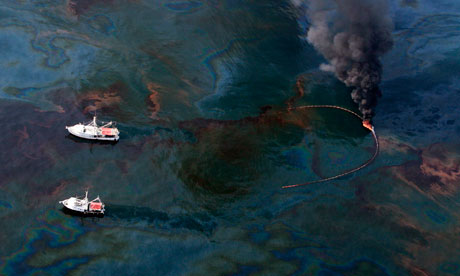
Clean-up boats in the Gulf of Mexico use a boom to collect and burn oil from the water�s surface.
---------
The pelican, matted feathers gummed up with thick brown oil, stands mutely in the tin bathtub. One rescue worker, in blue plastic overalls and goggles, gets a firm grip on its beak, and another squirts on some soap and begins to scrub.
Pictures of pelicans struggling to get free from thick brown globs are the defining image of the oil spill. But while the cleaning of the birds exercises a powerful tug on the heartstrings, missions such as this have set off a ferocious debate among conservationists. Should the pelicans or other Gulf wildlife � endangered sea turtles, dolphins, sperm whales � be rescued, or would it be kinder to kill them?
Over the last week or so, 50 to 100 pelicans a day have been arriving at this converted hangar at a former military base, transported by helicopter, boat and truck. The arrivals spiked dramatically after oil engulfed two barrier island bird refuges off Grand Isle. "We're getting slammed. The number of birds has increased a lot," said Rebecca Dunne, manager of the facility.
By the time they get to Fort Jackson, most birds are hungry, dehydrated and exhausted. The oil destroys their ability to regulate body temperatures, and the birds are too obsessed with preening their feathers to eat. They look like they have been sculpted out of dark chocolate. Once a veterinarian gives the go-ahead, the huddled birds are handed on to teams of rescue workers for cleaning.
Pairs of workers squirt the birds with a methyl soyate solution to remove the first heavy coating of grease, then shampoo them with a mild soap (brand name Dawn). The entire exercise takes about 45 minutes. The pelicans are then moved to an outdoor pen. Most are ready for release in a week or 10 days, Dunne said. "Pelicans are really solid birds, and are used to human contact, so they have a much better survival rate than seabirds," she said. "They don't stress out like herons or wading birds."
But critics dismiss the rescue effort as a costly feelgood exercise for humans. Only a fraction of oiled pelicans and other seabirds can be reached before they sink into the oil, and the few animals that are rescued have a relatively poor rate of short-term survival.
To date, 1,282 seabirds have been taken from the oil, of which 725 were already dead. Forty have been cleaned and returned to the wild, according to the Fish and Wildlife Service. The figures are even bleaker for sea turtles: 324 of the 387 recovered were dead. Three have been returned to the wild. All 42 of the dolphins stranded by the spill died. "There is a lot of debate about whether these are just mercy missions," said Elizabeth Griffin, a marine scientist at Oceana.
The scientific literature is divided. Two years after a 1990 spill in southern California, fewer than 10% of the rescued brown pelicans could be found, and none of those went on to breed, one research paper found. Other papers pointed to a higher survival rate, and conservationists say there is an ethical obligation to try to right the damage done by the spill. "What should we do? Just let them die?" said Jay Holcomb, the director of the International Bird Research Centre, which is involved in the rescue effort.
There is an additional consideration in the case of the brown pelican. The birds were brought to the brink of extinction by the use of pesticides in the early 1960s, and were only last year removed from the endangered species list. "If you have a threatened species, every single individual in that population that is rescued and returns to breeding status is critically important," said Doug Inkley, senior scientist at the National Wildlife Federation.
In some cases, though, the animals are beyond saving. "They are going to be so damaged and so harmed by getting into the oil that it may not be appropriate to clean and rehabilitate them," he said.
The size and duration of this oil spill � 55 days and counting � make returning the animals safely to the wild and ensuring their long-term survival far more complicated. Getting the animals medical attention is also fraught. A misguided rescue attempt could hurt the animals, or cause them to flee to an area more badly affected by oil. Conservationists say there have been isolated reports of pelicans killed in clumsy rescue attempts.
There is also a risk of an outbreak of disease from contact with humans or domesticated animals. After the Exxon Valdez spill, rescued sea otters contracted a form of herpes from contact with local dogs. The disease then spread through the population when the otters were returned to the wild.
More:
http://www.guardian.co.uk/environment/2010/jun/14/gulf-oil-spill-wildlife-birds